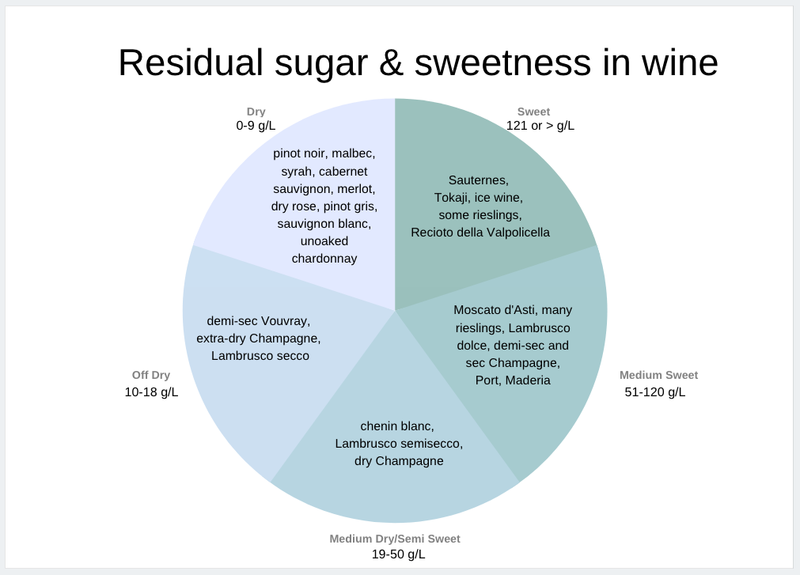Residual sugar is an often misunderstood wine term. Many people wrongly think residual sugar means the wine is sweet. To further complicate the topic, there is an undeserved stigma among wine drinkers regarding sweet wines.
Residual sugar (or RS) refers to the natural grape sugars left over in a wine after the alcoholic fermentation is complete. It is measured in grams per liter. The amount of residual sugar will vary in different types of wine depending on the varietal and style. Many wines labeled "dry" may have as much as 9 g/L of residual sugar. Wines with 35 grams per liter of residual sugar are those most would consider to taste sweet.
The sugar in grapes is a blend of glucose and fructose. Grape juice starts out intensely sweet. During the fermentation process, yeasts will eat the natural sugars, resulting in alcohol. When the yeasts consume all or almost all of the sugar present the result is dry; when the winemaker makes the choice to stop the fermentation before all of the sugar has been consumed by the yeast the resulting wines will retain some residual sugar. The resulting wines range from off dry to sweet.
DRY (0-9 G/L RS)
Almost all red and most white wines fall into this category.
Dry red wines include pinot noir, malbec, syrah, cabernet sauvignon, merlot, Valpolicella (except Recioto della Valpolicealla), dry rose.
Dry white wines include pinot grigio, unoaked chardonnay, some riesling, pinot gris, sauvignon blanc.
OFF DRY (10-18 G/L RS)
Off dry wines include demi-sec Vouvray, "extra dry" Champagne, Lambrusco secco
MEDIUM DRY AND SEMI-SWEET (19-50 G/L RS)
Medium dry/semisweet wines include chenin blanc, "dry" Champagne
MEDIUM SWEET (51-120 G/L RS)
Moscato d'Asti, Moscatos, Lambrusco, many Rieslings, "demi sec" or "sec" Champagne, Port and maderia are medium sweet wines.
SWEET (121 AND ABOVE G/L RS)
Often called dessert wines, Sauternes, Tokaji, ice wines, some rieslings, Recioto della Valpolicealla fall into this category.
THE VALUE
2018 Bell'Agio Lambrusco, Italy (about $12 retail)
THE SPLURGE
2018 Castello Del Poggio DOCG Moscato d'Asti, Italy (about $19 retail)
Lorri Hambuchen is a member of London's Institute of Wines and Spirits. Contact her at the Arkansas Democrat-Gazette, P.O. Box 2221, Little Rock, AR 72203, or email:
uncorked@thewinecenter.com
Food on 05/15/2019
